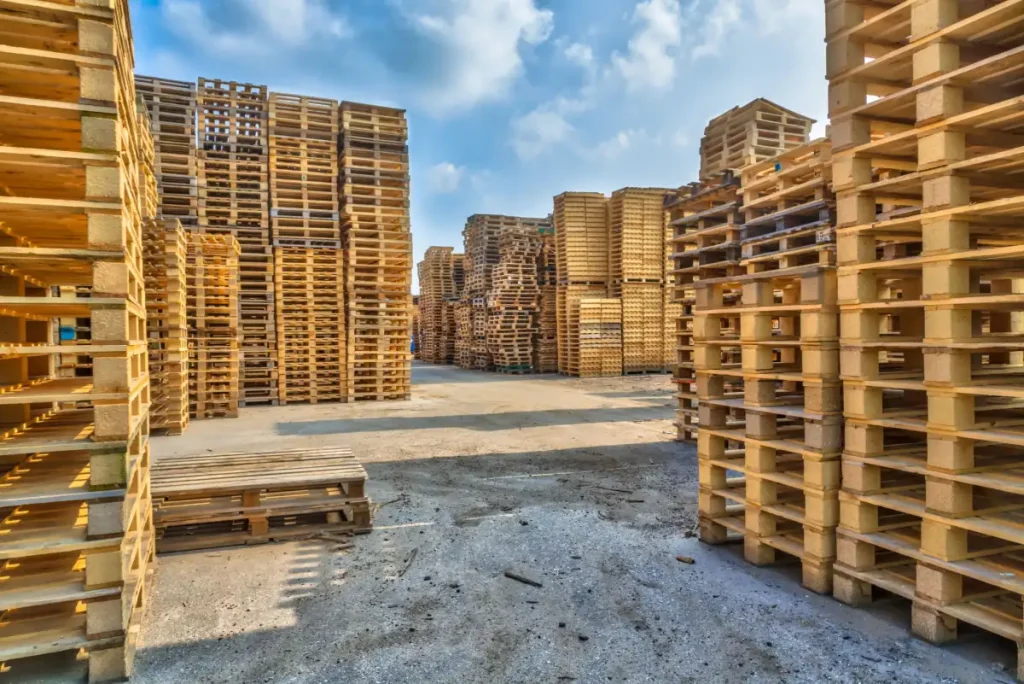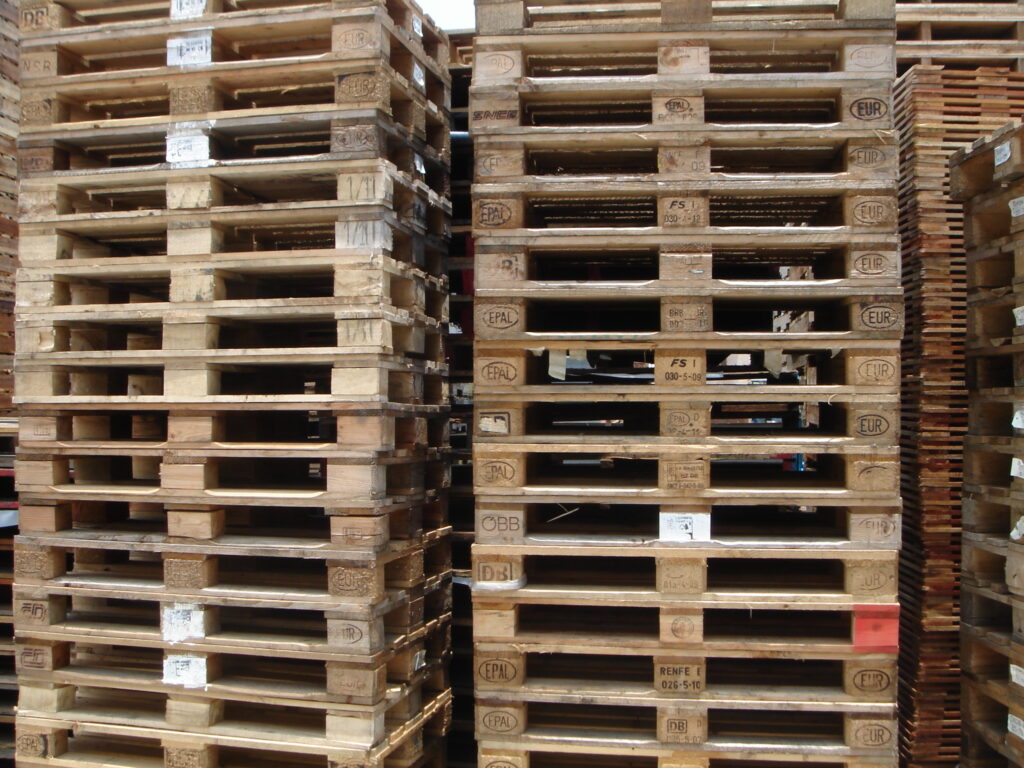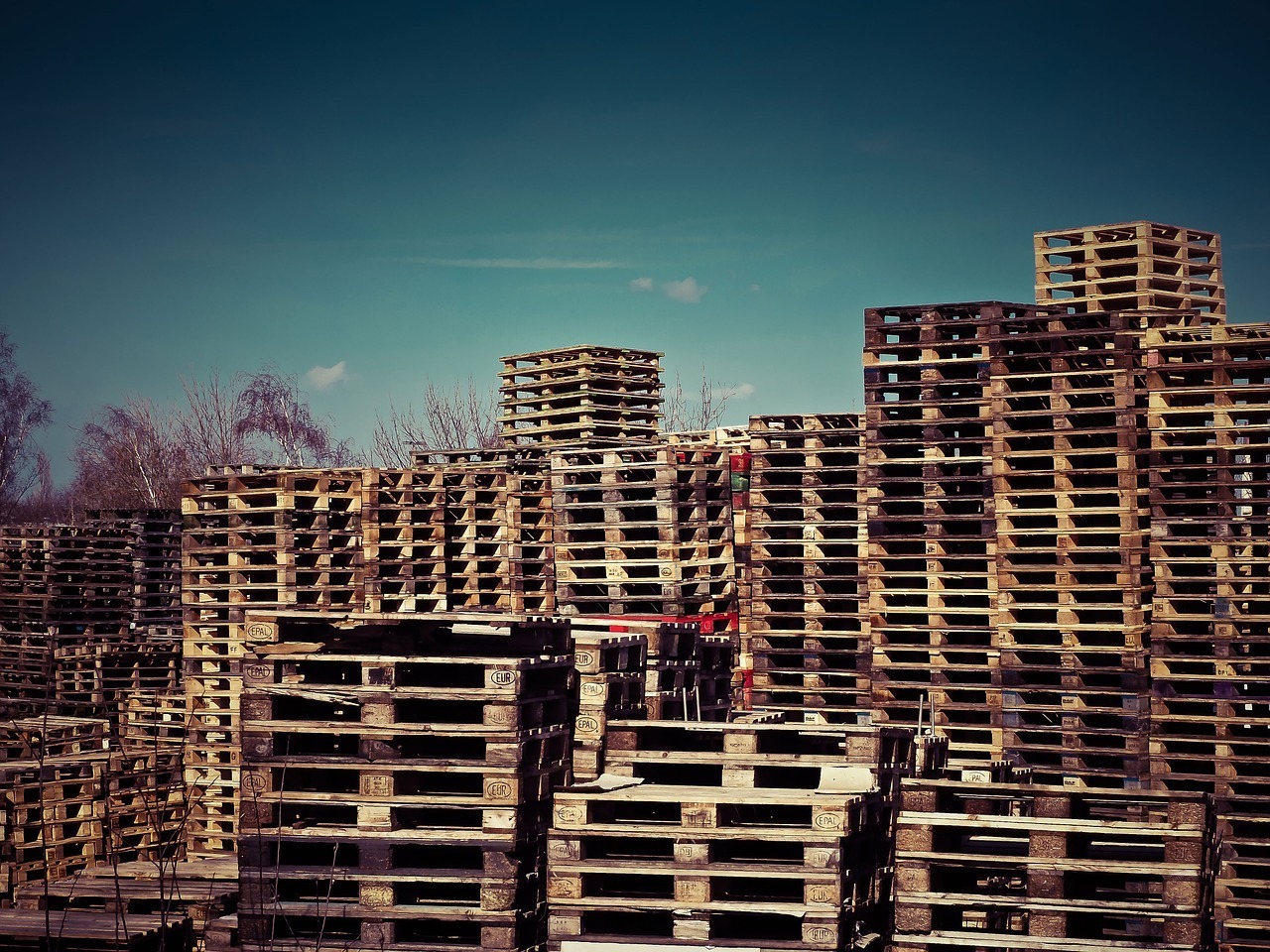Pallet recycling is an essential part of sustainable business practices. With millions of pallets used and discarded annually, finding responsible ways to recycle or dispose of them can make a significant environmental impact and help reduce waste.
By opting to recycle, you’re not only contributing to a more sustainable planet but also supporting a circular economy that transforms waste into valuable resources. This guide will explore the benefits of pallet recycling, the process involved, and how using recycled pallets can help businesses across Melbourne adopt greener practices.
If you’re looking for pallet collection and recycling services in Melbourne, Melbourne City Rubbish is here to help. Get in touch today for a free quote!

What are timber pallets?
Timber pallets are sturdy, flat structures made from wood, commonly used for storing, transporting, and handling goods. They are the most widely used type of pallet in industries such as logistics, warehousing, and shipping.
Typically made from softwoods like pine, timber pallets can also be crafted from hardwood for heavier loads. Due to their durability and versatility, timber pallets can be recycled, repaired, or repurposed. By engaging in timber pallet recycling, Melbourne businesses can actively reduce waste while promoting sustainability.
How are pallets made?
Pallets are manufactured from various materials, including wood, plastic, metal, and cardboard, with timber pallets being the most commonly used.
Sustainable pallet production often incorporates recycled materials, such as reclaimed wood or plastic, to minimise environmental impact. Many used pallets can also be refurbished and reused, extending their lifespan and reducing overall waste. Melbourne businesses looking to improve their environmental footprint can take advantage of pallet recycling programs to maximise reuse and sustainability.
The benefits of pallet recycling
Recycling used wood pallets instead of disposing of them offers multiple benefits. Beyond reducing waste, it also provides economic and environmental advantages. Here’s why your business should consider pallet recycling.
Reduce the need for natural materials
Recycling wood pallets helps reduce the demand for new timber, which in turn aids in forest preservation and resource conservation. By reusing materials efficiently, businesses contribute to maintaining biodiversity and reducing deforestation.
Keep costs low
Want to lower operational costs? Recycling broken or used pallets can be a cost-effective solution. Instead of purchasing new ones, businesses can refurbish and reuse existing pallets, which are often available at a lower price. This is particularly beneficial for industries that rely on pallets for logistics and supply chains.
Reduce landfill waste
Pallets discarded after a single use typically end up in landfill sites. With Melbourne facing increasing landfill challenges, simply throwing away used pallets is no longer a sustainable option. Recycling or repurposing pallets helps significantly reduce landfill waste and supports long-term sustainability goals.
Eliminate toxic chemicals from the environment
Wood pallets are often treated with chemicals to enhance durability and pest resistance. If not disposed of correctly, these chemicals can leach into the soil and waterways, posing environmental and health risks. Recycling pallets reduces the need for new chemically treated pallets, minimising potential harm.
Lower emissions during manufacturing
Producing new pallets requires significant energy and contributes to carbon emissions. By recycling and refurbishing pallets, businesses can help reduce the demand for new pallet production, ultimately lowering their carbon footprint and supporting climate change mitigation efforts.

The pallet recycling process
Recycling pallets are great for those looking to save cost, extend a pallet’s lifespan, and reduce waste. Here’s a step-by-step guide that can help you understand how this process works:
Collecting old pallets
The first thing you must do before recycling pallets is to collect old or used pallets. You can collect them from businesses, warehouses, or other locations where pallets are often used.
Pallet recyclers or other companies specialising in pallet recycling often work with suppliers and customers to gather these pallets and prevent them from ending up in landfills.
Assessing the condition of the pallets
Once collected, you need to carefully assess the pallets to determine their conditions. Some pallets may only require minor repairs, but others might be too damaged to be refurbished. This step is useful for categorising the pallets based on their possibilities and deciding which recycling method is right for them.
Refurbishing and reusing
Pallets that only have minor damage and are still in relatively good condition can be refurbished. Broken or damaged parts can be repaired. Once refurbished, these pallets can be reused.
Breaking down pallets in poor condition
Pallets that are too damaged to be repaired can be broken down or dismantled, separating the wood from metal parts to be recycled. The wood can then be repurposed for various uses, like mulch.
Upcycling second hand pallets
If you want to be more creative, you can try upcycling second hand pallets into new products. Some upcycling or pallet recycling ideas to try include furniture and home decor or garden planters. By doing this, you can turn these pallets into unique, functional items.
Turning old wood waste into new products
Finally, the wood waste generated from breaking down broken pallets can be processed and turned into new products. For example, particleboard, wood pellets for heating, or paper products.
Creative pallet recycling ideas
Upcycling or refurbishing used wooden pallets can be a great way to give the pallets a second life. Here are 5 fun and creative pallet recycling ideas you can try to reduce waste and promote a sustainable lifestyle.
DIY pallet furniture
First, you can upcycle old pallets into rustic-style furniture like coffee tables, sofas, or bookshelves. With some sanding, painting, and a bit of creativity, you can create unique furniture that isn’t only charming, but also functional.
Garden planters
Another way to recycle old pallets is by turning them into garden planters, such as vertical gardens. This is especially useful if you’re itching to do some gardening, but have limited space.
Simply stack or hang the pallets and fill the gaps with soil and other nutrients to start planting.
Shoe rack
Looking for ways to keep your shoes tidy? Avoid clutter by creating a shoe rack from used pallets! With some modifications, you can build a shoe storage or rack that keeps your shoes organised.
Pet bed
You can also turn pallets into a pet bed. Remember to add some cushioning and fabric to make it comfortable for your furry friends. This way, your pet can enjoy a safe and comfortable nap at any time of the day.
Children’s playhouse
If you have some basic carpentry skills, you might want to try building a small playhouse or fort for your children using recycled pallets. With some creativity, you can surely create a safe and sturdy play area that kids will love!
Stats and facts about used pallets in Australia
Pallets are a vital component in Australia’s logistics and supply chain industry. Thousands of pallets are used every day to move goods around the country and even across the globe.
Understanding the importance and impact of pallets can give us a better understanding of how crucial it is to recycle used pallets and have an effective waste management practice.
Here are some key statistics and facts about the use of pallets in Australia:
Pallet usage
Each year, Australia produces millions of new pallets to support logistics, transport, and supply chain operations. However, with such extensive use comes a significant amount of waste that requires responsible and sustainable waste management to reduce environmental impact.
Economic impact
Wooden pallets are important for the Australian economy. In fact, about 60% of all the goods in Australia are moved on wooden pallets. Not only that, but the high demand for wooden pallets led to a thriving industry, employing thousands of workers across the country.
Sustainable material
Australian wooden pallets are made from materials that are sustainable and eco-friendly. This is because wooden pallets are manufactured from natural timber, which is a renewable resource.
Moreover, Australian wooden pallets are generally sourced from sustainably managed forests.
Environmental impact
Despite being sustainable, improper disposal of wooden pallets can lead to overflowing landfills as well as soil or water contamination. In fact, around 140,000 tonnes of wooden pallets end up in landfills in Melbourne alone every year.
The demand for new pallet production can also lead to deforestation and habitat loss if not managed properly.
Recycling and repurposing
Australia has been proactive in managing pallet waste. Pallet recyclers have also been growing in number, which opens more employment opportunities and contributes to the circular economy. The recycling process also helps conserve timber resources and reduces the need for new pallets.
Popular materials
Wooden pallets are the most widely used pallets in Australia, particularly in the transport and logistics sector. However, there is a growing demand for plastic and metal pallets.
Get a quote for pallet removal in Melbourne
Looking for pallet recyclers near you to dispose of your used pallets responsibly and sustainably? For efficient and reliable pallet recycling services, contact a trusted provider in Melbourne!
At Melbourne City Rubbish, we’re dedicated to enabling and offering excellent solutions for pallet recycling in Melbourne, ensuring that all waste is handled responsibly.
Click here for a quote for pallet recycling in Melbourne.




